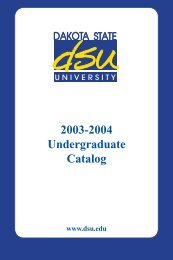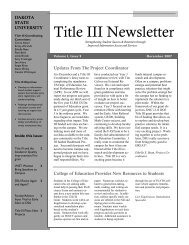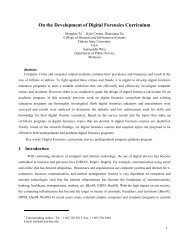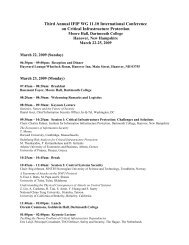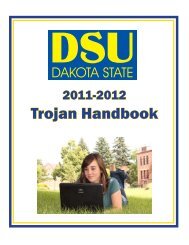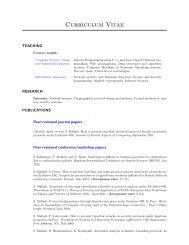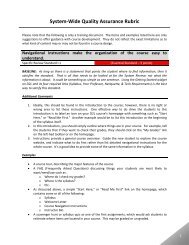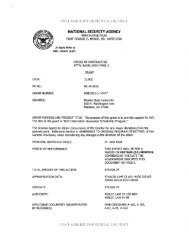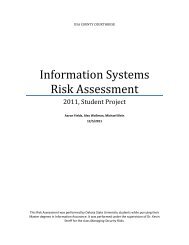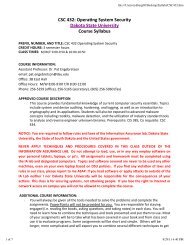Academic Calendar – Fall 2012 - Dakota State University
Academic Calendar – Fall 2012 - Dakota State University
Academic Calendar – Fall 2012 - Dakota State University
You also want an ePaper? Increase the reach of your titles
YUMPU automatically turns print PDFs into web optimized ePapers that Google loves.
<strong>University</strong> Regulations & Policies<br />
Safety and Security<br />
The safety of its students, employees and visitors is a matter of highest priority for the <strong>University</strong>. The goal of achieving maximum<br />
safety requires the continuous efforts of all persons within the campus community. Part of that effort includes being fully aware of institutional<br />
policies and procedures related to safety and security.<br />
Access - Campus academic buildings (including the Library and general-access computer labs in Beadle Hall, East Hall, Habegar<br />
Science Center and Kennedy Center) are open for use according to the schedule published for each academic term. The facilities of the<br />
Fieldhouse and Trojan Center are also open for use according to a published schedule. Use of computing facilities within these labs<br />
requires the completion of a DSU Computing Privileges form. Administrative buildings such as Heston Hall and the Physical Plant are<br />
usually open only during the announced working hours of the institution.<br />
Access to the four residence halls is restricted to the occupants and their immediate guests. The main door of each residence hall<br />
is locked 24 hours per day, 7 days a week. Residents use their <strong>University</strong> Card to gain access to their hall. In so doing, they may permit<br />
no other person to enter other than a person they know to be also a resident of the hall. The side doors of each hall are to be used only<br />
in case of fire or other emergencies. Persons other than residence hall students are to be escorted by their host during the period of time<br />
they are in the hall. A phone in the hall vestibule (between the outer and inner sets of doors) is available for the visitor to contact the<br />
host upon arrival. Residents are asked to challenge all unescorted strangers and/or report them to hall staff.<br />
Reporting - Each member of the campus community has the responsibility to report actions on the part of any person(s) taking place<br />
on campus which violate either <strong>University</strong> regulations or local, state or federal law. <strong>Dakota</strong> <strong>State</strong> does not have security (law enforcement)<br />
officers. Situations involving crimes which pose an immediate threat to any person should be immediately reported to the Madison<br />
Police Department by calling 911 or 9-911, if utilizing a landline phone located on the DSU campus. All other forms of criminal activity<br />
taking place within a residence hall should be reported immediately to the Resident Director (or Duty RA). For all other portions of the<br />
campus, the matter should be reported directly to the Student Services Center (256-5146).<br />
If a student or employee discovers an apparently unsafe condition on campus, other than in a residence hall, they should immediately<br />
report it to the Physical Plant Office (256-5222) during regular working hours. Information can also be reported to the Night Watchman<br />
by calling 480-3348 between 8:00 p.m. and 4:00 a.m. Unsafe conditions discovered within a residence hall should be reported to the<br />
Resident Director (or Duty RA).<br />
Actions - Any person encountering an immediate, life-threatening situation on campus should call 911 or 9-911 if utilizing a longline<br />
phone located on the DSU campus and request appropriate assistance. The Lake County dispatcher has direct access to fire, police and<br />
emergency medical personnel. It is essential that the caller provide adequate detail regarding the situation and, if possible, remain on<br />
the phone until help arrives. The general-access computer labs on campus are either equipped with a telephone or there is a telephone<br />
at the Help Desk in the immediate vicinity of the lab.<br />
In the event of a fire or bomb-threat alarm, all persons should immediately cease their activity and vacate the building via the nearest<br />
exit quickly, but without running. During inclement weather and if the situation permits, it is advisable to take along proper clothing as<br />
there may be a sizable time interval before re-entry to the building will be authorized. In the case of a bomb threat, the <strong>Dakota</strong> Prairie<br />
Playhouse and Conference Center will be swept first in order to provide students and employees an on-campus facility for temporary<br />
shelter. The “all clear” announcement may only be given by the appropriate <strong>University</strong> official. In the event of a bomb threat, the time<br />
of re-opening of the institution will be carried on KJAM radio and posted at the Playhouse/Conference Center. Each residence hall conducts<br />
a fire drill early in each semester.<br />
When a tornado is reported within the Madison area, the city will sound an alarm (a constant “wail” with a rising and falling intensity).<br />
All persons should go immediately to the basement of their building or to an interior room, avoiding windows and exterior above-ground<br />
walls, and remain until the “all clear” announcement is given.<br />
Taking simple precautions with regard to personal property is strongly advised. Theft does occur on campus and in the Madison<br />
community. Door(s) should be locked each time a person is away from their room/home and when sleeping. Persons should lock their<br />
car at night and never leave valuable items visible inside the vehicle. Keys should be kept in one’s possession at all times. Books and<br />
related materials should be safeguarded during each class day. Persons should engrave their name on their valuable items of property and<br />
record the serial number of each item. Insurance for damaged or stolen items of personal property is not provided by the <strong>University</strong>. By<br />
keeping a list of credit cards, checking account numbers, etc., a person can quickly notify these entities if a purse or wallet is lost or stolen.<br />
Communication - New students receive information regarding safeguarding themselves and their property during New Student<br />
Orientation. Articles on the subject are carried throughout each semester in the bi-weekly student newspaper, and at least one campuswide<br />
event/activity each semester is directed toward the topic of personal safety. Each of these efforts stresses the necessity for each<br />
person to take responsibility for their own safety and that of the campus community.<br />
A survey of student opinion regarding campus programs, policies, services, etc., including safety and security, is conducted each fall<br />
semester and the results reported in the campus newspaper. Ratings of student satisfaction, together with individual written concerns<br />
and suggestions, are used by campus administrators in the planning of improvements.<br />
In the event a violent crime occurs on campus which is judged by the <strong>University</strong> to pose a threat to members of the campus community,<br />
the Student Affairs Office has the responsibility to alert all students and employees in as timely a manner as possible. Means available<br />
to the institution to provide such an alert include the <strong>Dakota</strong> <strong>State</strong> <strong>University</strong> campus alert system. This system provides students the<br />
opportunity to establish a priority of methods to contact them. These include; mobile phone, second phone, home phone, business phone,<br />
campus assigned e-mail, secondary e-mail, text message sent to mobile phone and instant messaging. The action taken will depend upon<br />
the particular circumstances of the crime.<br />
Registered Sex Offenders-Federal law requires persons convicted of sex offenses to register with the appropriate law enforcement<br />
agency in their locale. For Lake County, the agency is the Madison Police Department. Any person can view the current list of registered<br />
sex offenders by going to the Department, 116 W. Center Street, and asking to view the list or via the web at the following address: www.<br />
cityofmadisonsd.com.-select City Departments, then Police.<br />
37



